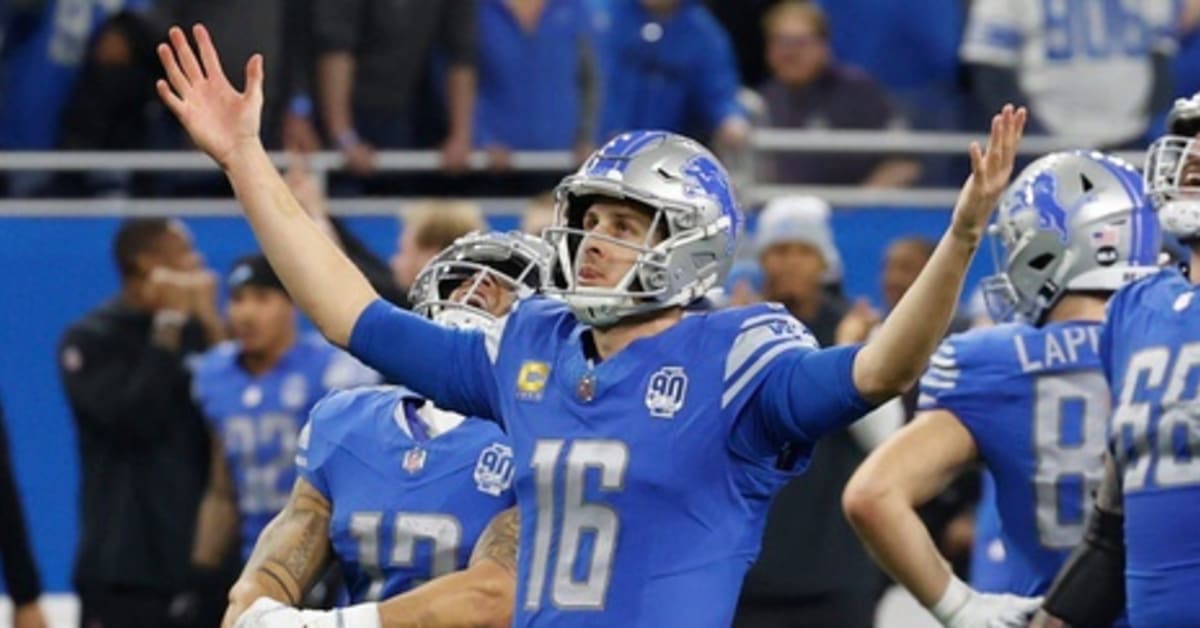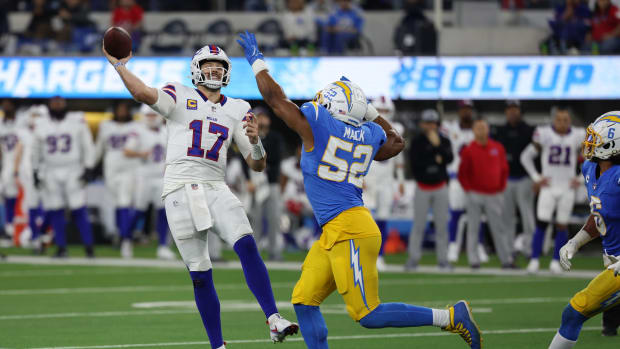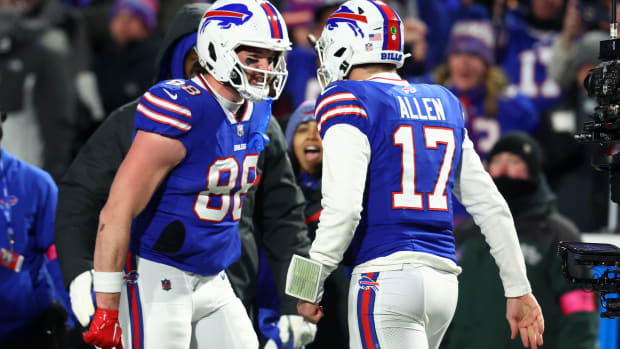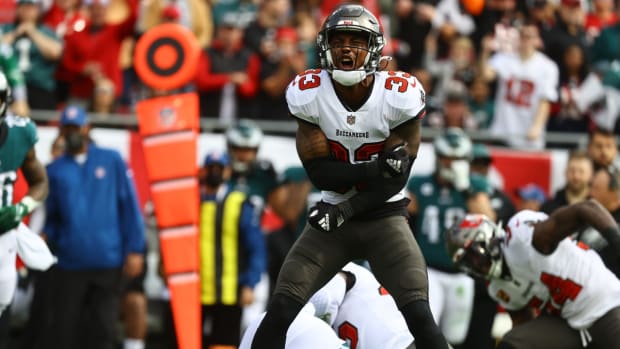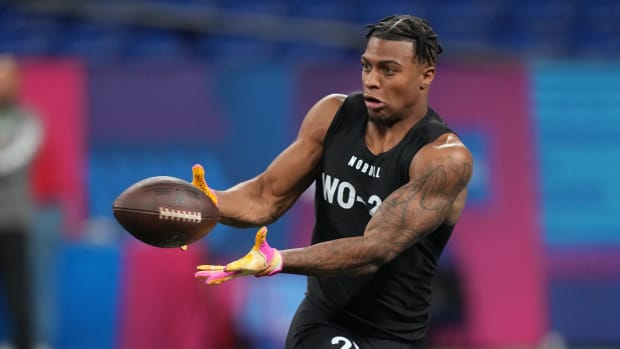Jared Goff’s Personality ‘Like a Punching Bag’ Is a Perfect Fit in Detroit
The Whitworths gathered in their Southern California living room last Sunday, all four children and their parents, everyone marveling at how what was became what is. It wasn’t long ago that Jared Goff played quarterback for the Rams, while Andrew Whitworth protected his blindside at left tackle and everyone in their immediate families knew exactly who to root for.
Now, Goff was playing for the Lions; his replacement in Los Angeles, Matthew Stafford, was returning to Detroit and still seeking the playoff win at Ford Field that eluded him for 12 seasons with the Lions. Whitworth was retired, a broadcaster, after winning a Super Bowl with Stafford in L.A. And his children, a group that once sort of unofficially included young Goff, weren’t sure where to direct their cheers.
“Wait! Wait!” one of them would say. “I don’t want Jared to do bad. I love him. But we’re Rams fans, right?”

Goff has the Lions two wins away from their first trip to the Super Bowl.
Eric Seals / USA TODAY NETWORK
Of course. But they could be Goff fans, too. There are a lot more of those these days—in Detroit and California and all points in between. In some ways, Whitworth watches Goff now, the QB who guided Detroit to its first playoff win in three decades and the divisional round of the NFL playoffs, where they will host the Buccaneers on Sunday (3 p.m. ET, NBC). That Goff—steady, classy, resilient as hell—can seem exactly the same. But other times, Whitworth studies the same player, in the same season, and sees growth upon growth, the same guy and entirely different one wearing the same No. 16 jersey and slinging darts.
“I saw true appreciation for his time as an L.A. Ram,” Whitworth says by phone Wednesday. “And, also, the new person he [has] become in Detroit—and the new man he is there. You saw the whole thing come full circle for him, in, obviously a game where he wanted to prove that he could win.”
The end of Goff’s tenure with the Rams can seem like it happened a million years ago. No need to belabor the unraveling, but the gist matters, because it was tense. He and coach Sean McVay, one of Whitworth’s other closest friends, weren’t exactly speaking. The Rams were turning toward John Wolford in a playoff game and away from the No. 1 pick they traded a bounty of draft capital to select in 2016.
Whitworth understood where each of his friends was coming from. The Rams knew they were talented, knew they had a window and wanted, he says, “to win right that second.” Goff was a veteran who firmly believed his best football was ahead of him. McVay has admitted he could have handled that situation better, but, Whitworth says, time has eased the feelings that felt so visceral at the time.
“The most beautiful part is, regardless of who could have handled it better, everybody’s grown from that moment, everybody’s in a really cool place. That’s the best part.”
He points to this season as proof. McVay led a Rams team few expected to contend for a playoff berth to a 10–7 record. “Maybe more impressive” than the Super Bowl run, Whitworth says, “maybe the best coaching performance he’s had in his whole career.” Meanwhile, Goff took a franchise that has all the ingredients necessary for a deep run to that playoff victory, at his former team’s—and former coach’s—expense. He sees both at the pinnacle of their respective careers while comparing their parting of ways to … a breakup. Over time, the reasons tend to fade. This breakup, Whitworth says, “was great for everybody.” And he’s right.
How many NFL trades where disputes become at least a little bit public ended with the quarterback one team moved from proving them right and wrong at the same time? Maybe it wasn’t Goff’s skills, or anything beyond his fit in McVay’s offense that made their pairing a less-than-ideal fit. In pro football, the pairing of scheme and skill set and roster talent around quarterbacks matters as much as, or more than, the strength built into their throwing arms. Maybe both sides were “right,” as far as anyone in the NFL can be. Maybe Goff is better in Detroit because he’s perfect for Detroit—knocked down, standing upright, unafraid of things such as postseason droughts and preseason analysis and this nagging idea that he wasn’t a franchise quarterback, that he couldn’t do precisely what he has done this season.
“I don’t know what you’d want different,” Whitworth says. “Jared’s an awesome part of this organization that hadn’t won in so long, and here’s this guy that, whatever you want to say about him, has found ways to win. And Sean has gone from winning a Super Bowl to having a disaster [season] to rebuilding in a matter of six months. It’s awesome to see them in these really cool spots, where it’s like, Man, this is exactly where I want to watch them play football—exactly where they’re at.
“I don’t think that happens too often.”
He’s right about that, too. The Goff-Rams-McVay breakup wasn’t smooth like most splits. But it also appears to have spurred growth in both the quarterback and his former coach. A “catalyst,” Whitworth calls it.

Whitworth on the Goff–McVay breakup: "It’s awesome to see them in these really cool spots, where it’s like, Man, this is exactly where I want to watch them play football—exactly where they’re at."
Joe Nicholson/USA TODAY Sports
Having played for the Cincinnati Bengals in so many Super Bowl–less seasons, Whitworth understands the mettle necessary to enact improbable change, to end streaks and change narratives. Goff ranks among the most even-keel teammates he ever played with, which, Whitworth argues, is the kind of makeup required to do what Goff did last Sunday.
Just don’t mistake any of that for done, or peaked. Outsiders might look at Sunday’s matchup, against the surging but inconsistent Tampa Bay Buccaneers, and see an easy victory. But nothing has come easily for Goff, who went out and went to work and fought for his current situation, even when his own coach lost belief in him. Outsiders dismissed him, too, and not one time but for years.
Whitworth sees Detroit in Goff, a shared ethos between a city and the star quarterback who had lost some luster. He considers Goff’s roots in Northern California and the notion that, if the San Francisco 49ers beat the Green Bay Packers on Sunday evening, they will host the NFC championship game in another week.
Imagine that. Goff beats his old team. The Lions win their first playoff game since George H. W. Bush was president. Then Goff heads home, to face the formidable 49ers, and, should Detroit triumph, cements a Super Bowl berth near where he grew up. “I mean,” he says, “it’s a movie script.” With Goff in a starring role. “Jared has that personality like a punching bag,” Whitworth says. “You hit him, and he pops back up. You hit him, and he pops back up …”
































